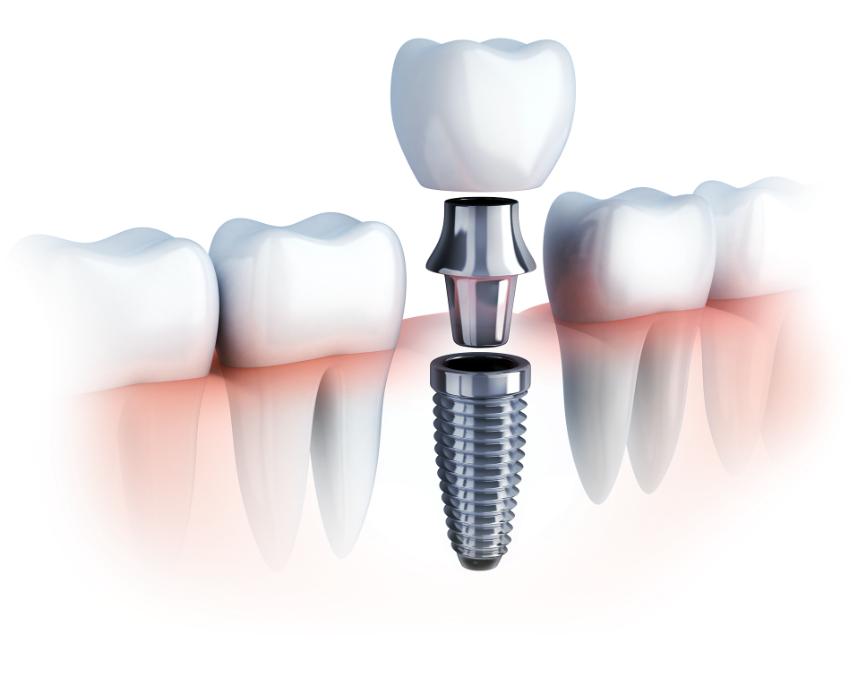Dental Sense - Questions
Dental Sense - Questions
Blog Article
Dental Sense - The Facts
Table of ContentsDental Sense for BeginnersThe 15-Second Trick For Dental SenseHow Dental Sense can Save You Time, Stress, and Money.Not known Facts About Dental Sense
are clinical devices surgically dental implanted into the jaw to restore a person's capability to chew or their look. They supply assistance for man-made (fake) teeth, such as crowns, bridges, or dentures. When a tooth is shed as a result of injury or condition, an individual can experience difficulties such as quick bone loss, defective speech, or modifications to eating patterns that result in pain.Oral dental implant systems contain an oral implant body and dental implant abutment and might also include an abutment fixation screw. Same day dental implants. The oral implant body is operatively inserted in the jawbone instead of the tooth's origin. The dental implant joint is normally affixed to the implant body by the joint addiction screw and prolongs through periodontals right into the mouth to support the affixed fabricated teeth
(https://linktr.ee/dentalsense1)Framework of The Oral Implant System choosing dental implants, talk with your dental service provider about the possible advantages and risks, and whether you are a prospect for the treatment. Points to consider: Your total health and wellness is an essential consider determining whether you are an excellent prospect for dental implants, for how long it will certainly require to recover, and how much time the dental implant may stay in place.
Smoking cigarettes might affect the recovery procedure and reduce the long-term success of the dental implant. The recovery procedure for the dental implant body might take numerous months or longer, throughout which time you typically have a temporary abutment in place of the tooth. the dental implant procedure: Carefully comply with the oral health guidelines offered to you by your oral service provider.
Some Known Questions About Dental Sense.
Implant failing can cause the need for one more surgical procedure to take care of or replace the implant system. Recovers the ability to eat Restores aesthetic look Aids keep the jawbone from diminishing because of bone loss Maintains the wellness of the bordering bone and gum tissues Aids keep nearby (neighboring) teeth stable Boosts lifestyle Damages to surrounding natural teeth during dental implant positioning Injury to the surrounding tissues during surgical treatment, such as sinus opening Injury during surgical treatment (as an example, crack of surrounding jawbone) Inadequate feature, such as feeling like the teeth do not attack with each other generally An experience that the tooth is loose or turning in area resulting from a joint screw loosening up Implant body failing (looseness of the implant body) due to systemic infection, which might be much more most likely in clients with uncontrolled diabetes as a result of regional infection in bone and periodontals sustaining the implant body as a result of postponed recovery, which may be most likely in patients who smoke Problem cleaning up the gum tissues around the implant, resulting in bad oral hygiene Unattended periodontal illness Post-surgical numbness as a result of nerve impingement or damages Constantly alert healthcare service providers and imaging service technicians that you have dental implants prior to any kind of magnetic vibration imaging (MRI) or x-ray treatments.
FDA is not knowledgeable about any kind of adverse occasions reported for MRI or x-ray treatments with dental implants. Oral implants systems are typically made of materials that follow worldwide consensus criteria of the International Organization for Standardization (ISO) or ASTM International. These standards have information of what makes a risk-free material.

An oral implant is a structure that replaces a missing tooth. With screw-like devices, the cosmetic surgeon inserts a dental implant into the jawbone, and it acts as a support for a fabricated tooth, called a crown.
Some Known Details About Dental Sense
Some people are not qualified for oral implant surgical procedure. It is for dental specialists to operate on people with: severe illnessuncontrollable metabolic diseasebone or soft cells disease or infectionIf these concerns are fixed, an individual can have the surgery. In, dental specialists avoid running on people with: If people with any one of the above go through oral implant surgical procedure, there is a greater danger of the dental implant falling short.

Dental dental implant surgery is a customized procedure. It's not the same for every person. But the adhering to gives a general overview of what you can anticipate your dental professional, oral doctor, periodontist or prosthodontist to do: Place the implant surgically. Provide you time to recover. Attach the blog post and last crown, bridge or denture.
Next, your doctor will meticulously position the oral implant into your jaw. If your implant is near the front of your mouth, your dentist will make a short-term tooth for you to put on up until you recover.
The Only Guide to Dental Sense
Throughout the recovery stage, your jawbone needs to fuse to the dental implant. This procedure can take anywhere from 3 to nine months.
Once your implant heals, your dental professional can affix the joint (little connector article) and your final remediation (crown, bridge or denture). This usually takes regarding one hour to finish and may call for a second small surgical treatment. You should not feel any pain throughout your oral implant treatment since your supplier will certainly utilize medication to numb your gums.
Report this page